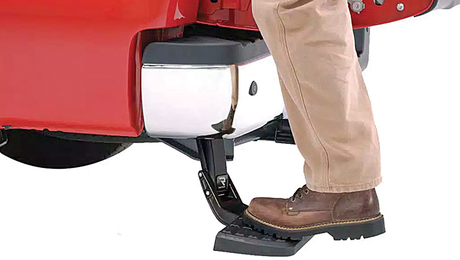help!
I have a home with aluminum wiring and I would like to install a GFI in the bathroom wall socket next to the tub. All the gfi’s that I have looked at state not suitable for aluminum wire. What should I do.
Thanks
Malcolm
help!
I have a home with aluminum wiring and I would like to install a GFI in the bathroom wall socket next to the tub. All the gfi’s that I have looked at state not suitable for aluminum wire. What should I do.
Thanks
Malcolm

The RealTruck AMP Research Bedsteps give you easy access to your truck-bed storage.

"I have learned so much thanks to the searchable articles on the FHB website. I can confidently say that I expect to be a life-long subscriber." - M.K.
Get home building tips, offers, and expert advice in your inbox
Fine Homebuilding
Get home building tips, offers, and expert advice in your inbox
© 2024 Active Interest Media. All rights reserved.
Fine Homebuilding receives a commission for items purchased through links on this site, including Amazon Associates and other affiliate advertising programs.
Get home building tips, offers, and expert advice in your inbox
Become a member and get instant access to thousands of videos, how-tos, tool reviews, and design features.
Start Your Free TrialGet complete site access to expert advice, how-to videos, Code Check, and more, plus the print magazine.
Already a member? Log in
Replies
There are special kits with connectors suitable for transitioning between Al and Cu but unless you're very careful and have some experience probably best left to an electrician.
Thank you very much for your reply.
Perhaps I might need to just get an electrition in.
Thanks Again
Malcolm
It is my understanding that the issue with al and cu wire combo is that they have dif rates of expansion and contraction when heated and cooled, so the wires can get loose AND there is a charge which develops between the two unlike metals (electro___) My brain is asleep now. Big memory loss today. Anyway, the upshot of the electrical charge is that corrosion sets it.
One remedy is to add a copper wire pigtail to the GFCI outlet and connect that set of wires to the al wires using a wire cap made special for this purpose. The caps are purple and have a special lubricant in them to prevent corrosion. Be sure to twist the wires together with a set of linesman pliers rather than depending on the wirecap twisting to do the job. This way there will be less opportunity for the wires to loosen with use.
Depending on where you live, the cap availability will vary. In NYC I cannot get them at the elec supply house - only at HD. In the suburbs I can get them everywhere. They are available in packets of 2, 4 and boxes of 50.
F
Thank you very much. That seems the most prudent copper pigtail with the proper Aluminum/Copper wire nuts. They might be hard to find in Ohio also
Thanks for your help
Malcolm
Take a look at: http://www.inspect-ny.com/alreduce.htm for a wealth of info regarding aluminum wiring info. Gardner Bender (I think gardnerbender.com will get you there-or google for it) has an antioxidant called Ox-Gard that I have used for years in my 1968 aluminum wired house. Not an electrician--general contractor. Tyr
Mal,
Your best course of action---rewire the house, replace the aluminum wiring. Not good news.
The fact is, aluminum branch circuit wiring (15 and 20 amp circuits), even if installed properly, is prone to develop dangerous problems. And when poor additions or modifications have been made, problems are more likely.
The problems arise from two properties of aluminum wiring--with heat developed by the normal flow of electricity, it expands and contracts enough to loosen up the connections, and the aluminum forms an oxide layer when exposed to air. The oxide layer is a poor conductor of electricity, so a connection gets hot when current flows, because of the resistance. This sets up a vicious cycle. Sometimes the result is enough heat to start a fire.
By all means, visit the "inspect-NY" website, it's the best source of good info on aluminum branch circuit wiring. Notice that one of the issues discussed is the purple wirenuts supposedly good for joining aluminum and copper wiring. The website author, an expert on the subject, provides info that indicates the purple wire nuts ARE NOT effective at splicing Al to Cu. I believe that information to be true. I do not use the purple wirenuts; if I have to make an emergency/temporary Al to Cu splice, I use the technique described on the website.
Good luck,
Cliff